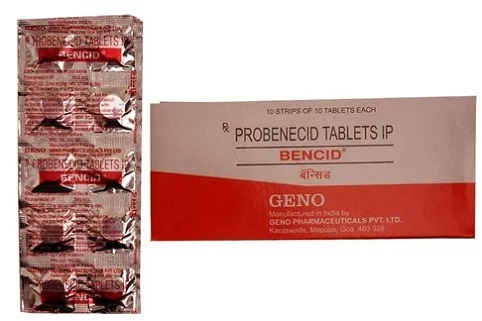Nikhil Prasad Fact checked by:Thailand Medical News Team Apr 15, 2025 18 hours, 49 minutes ago
Medical News: A new study by scientists in China is shedding light on a possible treatment for one of the most dangerous dual infections affecting people today—the simultaneous infection of SARS-CoV-2, the virus that causes COVID-19, and RSV or respiratory syncytial virus. While these viruses can be deadly on their own, coinfection can result in more severe symptoms, longer illness, and higher death rates. Until now, no specific treatment has been developed to target both viruses at once.
 Probenecid Offers New Hope in Treating COVID-19 and RSV Coinfections
Probenecid Offers New Hope in Treating COVID-19 and RSV Coinfections
Researchers from Shunde Polytechnic, Guangzhou University of Chinese Medicine, Guangzhou University of Traditional Chinese Medicine, and Guangdong Provincial Hospital of Chinese Medicine have identified the drug probenecid—a medicine already approved and used for treating gout—as a potential solution. This
Medical News report highlights the exciting findings from their comprehensive and cutting-edge research.
An Old Drug with New Possibilities
The research team used a wide array of modern technologies, including systems pharmacology, molecular docking, molecular dynamics simulations, and structure-activity relationship (SAR) analysis. These methods allowed them to analyze how probenecid works on a molecular level when introduced into the body during a SARS-CoV-2 and RSV coinfection.
They began by identifying 141 molecular targets where probenecid overlaps with proteins involved in both COVID-19 and RSV infections. Using this data, they built a protein-protein interaction network and highlighted the top 16 key targets for the drug. These include AKT1, EGFR, CASP3, ALB, CTNNB1, SRC, and HSP90AA1, which are all involved in regulating immune response, inflammation, and viral replication.
Targeting the Root of Viral Inflammation
The researchers found that probenecid may help control viral infections not by directly killing the virus, but by modulating the immune system and inflammatory responses. It influences several important immune signaling pathways, including those related to the Toll-like receptor, TNF (tumor necrosis factor), IL-17, NOD-like receptor, and cytokine-receptor interactions.
Further analyses confirmed that probenecid effectively binds to the proteins related to these pathways. Molecular docking showed a strong fit between the drug and these targets, and simulations demonstrated that these connections remain stable in a real biological environment. Of special interest were the proteins SRC and HSP90AA1, which seem to be the most likely core targets through which probenecid operates.
A New Avenue for Dual Infection Treatment
This finding is especially important because coinfections are becoming more common, particularly in vulnerable groups such as the elderly or those with weakened immune systems. Current medications used for COVID-19 or RSV alone are not enough when both viruses are present. Probenecid’s ability to target both at once through immune and inflammation pathways makes it a
promising candidate for repurposing.
The research also shows that the drug reduces oxidative stress and enhances the body’s own viral defenses. This opens the door to using existing, affordable drugs like probenecid in new and impactful ways—offering quicker solutions while new drug development can take years.
Conclusion
This new research offers a powerful insight into how an older drug like probenecid can be repurposed to tackle serious modern viral challenges. By influencing core immune and inflammatory responses and directly interacting with critical proteins like SRC and HSP90AA1, probenecid may provide a much-needed option for those suffering from dangerous coinfections with SARS-CoV-2 and RSV. Although further lab studies and clinical trials are necessary, this study lays the groundwork for future breakthroughs in dual-virus treatment approaches and highlights the urgency of drug repurposing in global health crises.
The study findings were published as an abstract in the peer reviewed journal: Frontiers in Microbiology.
https://www.frontiersin.org/journals/microbiology/articles/10.3389/fmicb.2025.1552603/abstract
For the latest COVID-19 News, keep on logging to Thailand
Medical News.
Read Also:
https://www.thailandmedical.news/news/probenecid-found-to-inhibit-respiratory-syncytial-virus-replication
https://www.thailandmedical.news/news/probenecid-shows-promise-against-respiratory-virus-human-metapneumovirus-hmpv
https://www.thailandmedical.news/news/lithium-chloride-shows-surprising-ability-to-block-inflammatory-damage-from-covid-19-spike-protein-in-lung-cancer-cells
https://www.thailandmedical.news/pages/thailand_doctors_listings
https://www.thailandmedical.news/articles/hospital-news
